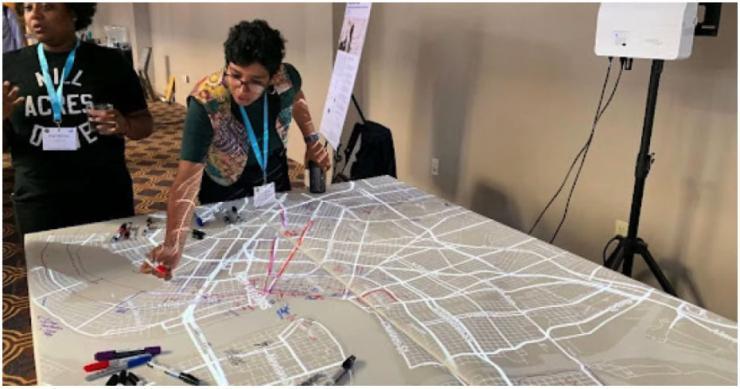BIPOC Youth Learn Map-Making to Build Disaster Resilience
Feb 24, 2022 — Atlanta, GA

BIPOC Youth Learn Map-Making to Build Disaster Resilience
Because natural disasters disproportionately affect underserved communities, middle school students in Savannah, Ga., are learning to use mapping tools to design infrastructure changes that could protect their neighborhoods.
MetroLab Network has partnered with Government Technology to bring its readers a segment called the MetroLab Innovation of the Month series, which highlights impactful tech, data and innovation projects underway between cities and universities. In a special series, the Innovation of the Month is currently focusing on the award-winning and innovative projects championed by MetroLab’s member universities and civic partners that advanced to Stage 2 of the NSF Civic Innovation Challenge. If you’d like to learn more or contact the project leads, please contact MetroLab at info@metrolabnetwork.org for more information.
- - - -
In this month’s installment of the CIVIC Stage 2 Innovation of the Month series, we highlight a project called Visualizing Resilience: BIPOC Youth Advocacy through Mapmaking from Savannah, Ga. The project is empowering young people to challenge and redefine the stories that maps tell about their lives and communities in a bid to make their communities more resilient in the face of disasters. MetroLab’s Elias Gbadamosi spoke with the team’s civic and academic partners about their engagement process and implementation plan in Stage 2 of the Civic Innovation Challenge.
Elias Gbadamosi: Can you tell us about your project and what the origin was?
Yanni Loukissas: In this program, we are developing a curriculum based on previous work our co-principal investigator Nisha Botchwey did to develop a youth advocacy program, called Youth Engagement and Action for Health (YEAH!), for middle school students around healthy communities. The new program will focus on disaster resilience and integrating community mapping workshops using Map Spot. Map Spot came out of a collaboration between data artist Jer Thorp and me to develop local spaces for grass-roots map-making, where people can creatively and collaboratively explore data. Map Spot empowers people to understand, but also challenge and even redefine the stories that maps and data tell about their lives and about the places they live. Youth will use Map Spot to develop and present infrastructure recommendations that can make their communities more resilient in the face of intersecting disasters.
Allen Hyde: This project also builds on a larger initiative at Georgia Tech, the Smart Sea Level Sensors project in Savannah, where we developed a strong relationship with the nonprofit Harambee House, Savannah State University and the city of Savannah Office of Sustainability.
Through the planning grant phase, we identified that youth were a sizable yet vulnerable demographic in Savannah's West Side neighborhoods like Hudson Hill, and Harambee House prioritizes training youth to become future leaders in the fields of racial and environmental justice. We reached out to Savannah and Chatham County Public School System to pilot our program designed to help youth become advocates for disaster resilience and preparedness in their community: Youth Advocacy for Resilience to Disasters (YARDs).
[continued]
Read the full article in Government Technology: Feb. 14, 2022
https://www.govtech.com/analytics/bipoc-youth-learn-map-making-to-build-disaster-resilience?fbclid=IwAR1GteWcsxb9GzZhLfvVPAC9jidCtDWz7_faHzYVdj3zUQr6myK7wdH64fw
Walter Rich




